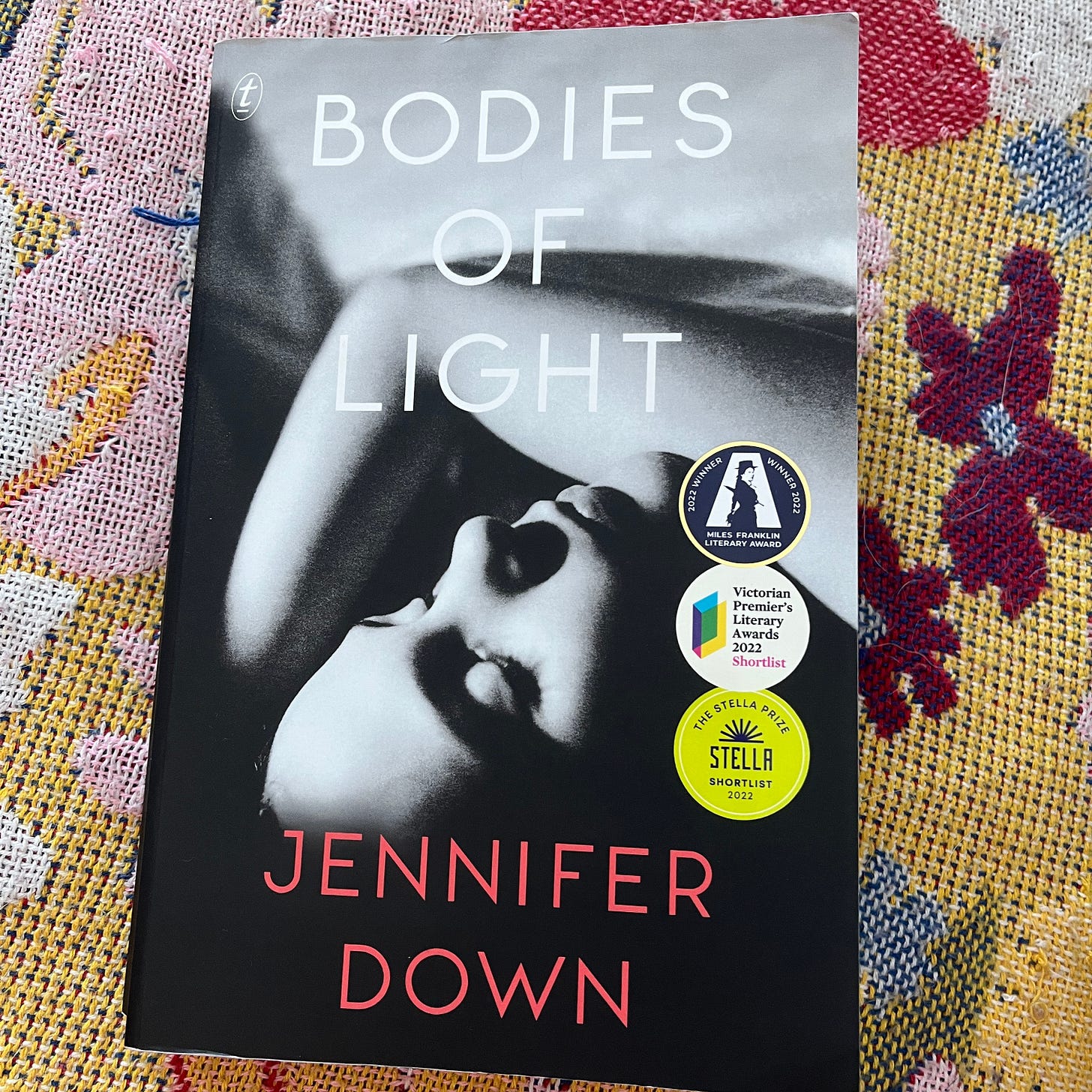BODIES OF LIGHT by Jennifer Down
Trigger warning: this book has plot points which include abuse (sexual, emotional and physical), suicide and the death of children.
Trigger warning: this book has plot points which include abuse (sexual, emotional and physical), suicide and the death of children. Readers should be warned that the story is sensitive but may wish to pass on this book if those topics are difficult for them. Further, this review discusses difficult topics as outlined - please proceed with caution. This review may also contain what might be considered spoilers.
Winner of the 2022 Miles Franklin Literary Award for Australian fiction, Bodies of Light by Jennifer Down is an extraordinary novel, telling the story of Maggie Sullivan (aka Josie and Holly), a woman whose childhood was spent surrounded by destruction and in state care, and tells the story of her life as an adult, mostly in retrospect.
The story is grounded in an unexpected message on Facebook, which takes the now Holly back through the various moments in her life which have shaped her identity. The message has the capacity to blow her life apart and we learn through the book the risk Holly takes in responding to it.
Beautifully written, it is difficult not to feel deep compassion and empathy for this woman, whose life has been pockmarked time and again by tragedy, leading her to struggle to trust others and participate in self destructive behaviours. It’s clear she wants a good, happy life, but she doesn’t know how to live that way - and so when good people cross her path, she ultimately hurts them (before they hurt her first). As a child, Maggie suffers abuse (physical, emotional and sexual) at the hands of those meant to care for her. As an adult she experiences unspeakable tragedy and sadness, and things begin to spiral from there.
However, I have one big complaint about the plot of this book.
During the story of Maggie, she has and loses three children, ostensibly to SIDS (though this is never fully explored). Maggie then comes under police suspicion and is charged. This section of the book is a classic “ripped from the headlines” trope, in that it borrows heavily from the real-life story of Kathleen Folbigg. Ms Folbigg is currently in prison for the murder of three of her children and manslaughter of the fourth, despite there now being significant and compelling evidence that brings her conviction into serious doubt.
I get that Folbigg’s story is a unique one and is almost too bizarre to be real, but it is real. While Maggie is handled with kindness and compassion by the author, I cannot help but bump up against the utilising of a real person’s trauma and pain - the death of four babies - for fictional purposes, with financial gain to follow for that author. Kathleen Folbigg’s story is hers to tell, rather than to be co-opted for a novel. Maggie’s story in Bodies of Light is not identical to Kathleen’s, but it also isn’t different enough that the link can’t quickly and easily be made to Folbigg’s case. I have a real problem with that. I understand that a writer might take real life stories and fictionalise them and I don’t have a problem with that, per se. But those stories do need to change sufficiently that the story line is (a) unique and (b) fictional. Maggie’s life is different to Kathleen’s real life in many ways, but not different enough, in my opinion. Honestly, it felt like lazy plotting and treading water in a pool of trauma porn.
It’s a shame because I felt really deep empathy for Maggie/Josie/Holly and the sense of pain she exists with. That aspect of Down’s writing is spectacular - Maggie feels very real. She is both brave and flawed. She is both strong and broken. I wont forget her for a long time. But I do feel Maggie deserved her own story, in relation to the babies, instead of someone else’s. It was a betrayal of her I couldn’t overcome, despite being otherwise captivated by Maggie’s story.
It is no surprise that Bodies of Light is an award winning book - as well as the Miles Franklin, it was shortlisted for the Stella Prize and the Victorian Premier’s Literary Award in 2022. It deserves to be - it is well written, compelling and haunting, a novel that will stay with the reader beyond the final page. I remain, however, certain that had Maggie been given her own experience of the birth and death of children, it would have then been flawless.



